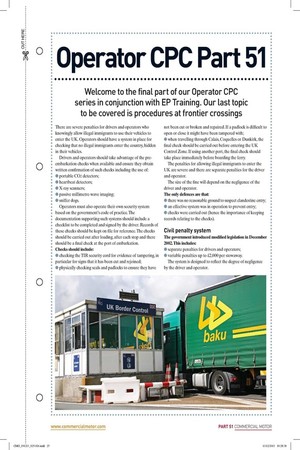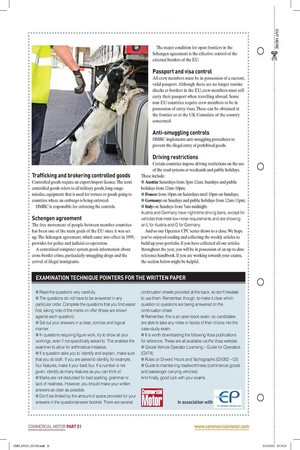Operator CPC Part 51
Page 20

Page 21

If you've noticed an error in this article please click here to report it so we can fix it.
Welcome to the final part of our Operator CPC series in conjunction with EP Training. Our last topic to be covered is procedures at frontier crossings
There are severe penalties for drivers and operators who knowingly allow illegal immigrants to use their vehicles to enter the UK. Operators should have a system in place for checking that no illegal immigrants enter the country, hidden in their vehicles. Drivers and operators should take advantage of the preembarkation checks when available and ensure they obtain written confirmation of such checks including the use of: • portable CO2 detectors; • heartbeat detectors; • X-ray scanners; • passive millimetre-wave imaging;
• sniffer dogs.
Operators must also operate their own security system based on the government's code of practice. The documentation supporting such systems should include a checklist to be completed and signed by the driver. Records of these checks should be kept on file for reference. The checks should be carried out after loading, after each stop and there should be a final check at the port of embarkation. Checks should include: • checking the TIR security cord for evidence of tampering, in particular for signs that it has been cut and rejoined; • physically checking seals and padlocks to ensure they have not been cut or broken and repaired. If a padlock is difficult to open or close it might have been tampered with;
• when travelling through Calais, Coquenes or Dunkirk, the final check should be carried out before entering the UK Control Zone. If using another port, the final check should take place immediately before boarding the ferry.
The penalties for allowing illegal immigrants to enter the UK are severe and there are separate penalties for the driver and operator.
The size of the fine will depend on the negligence of the driver and operator. The only defences are that • there was no reasonable ground to suspect clandestine entry; • an effective system was in operation to prevent entry;
• checks were carried out (hence the importance of keeping records relating to the checks). Civil penalty system The government introduced modified legislation in December 2002. This includes: • separate penalties for drivers and operators;
• variable penalties up to £2,000 per stowaway. The system is designed to reflect the degree of negligence by the driver and operator. Trafficking and brokering controlled goods
Controlled goods require an export/import licence. The term controlled goods refers to all military goods, long-range missiles, equipment that is used for torture or goods going to countries where an embargo is being enforced.
HMRC is responsible for enforcing the controls. Schengen agreement
The free movement of people between member countries has been one of the main goals of the EU since it was set up. The Schengen agreement, which came into effect in 1995, provides for police and judicial co-operation.
A centralised computer system pools information about cross-border crime, particularly smuggling drugs and the arrival of illegal immigrants.
The major condition for open frontiers in the Schengen agreement is the effective control of the external borders of the EU. Passport and visa control
All crew members must be in possession of a current, valid passport. Although there are no longer routine checks at borders in the EU, crew members must still carry their passport when travelling abroad. Some non-EU countries require crew members to be in possession of entry visas. These can be obtained at the frontier or at the UK Consulate of the country concerned. Anti-smuggling controls
HMRC implements anti-smuggling procedures to prevent the illegal entry of prohibited goods. Driving restrictions
Certain countries impose driving restrictions on the use of the road systems at weekends and public holidays. These include: • Austria: Saturdays from 3pm-12am. Sundays and public holidays from 12am-10pm; • France: from 10pm on Saturdays until 10pm on Sundays; • Germany: on Sundays and public holidays from 12am-11pm;
• Italy: on Sundays from 7am-midnight.
Austria and Germany have night-time driving bans, except for vehicles that meet low-noise requirements and are showing an L for Austria and G for Germany.
And so our Operator CPC series draws to a close. We hope you've enjoyed reading and collecting the weekly articles to build up your portfolio. If you have collected all our articles throughout the year, you will be in possession of an up-to-date reference handbook. If you are working towards your exams, the section below might be helpful.










































